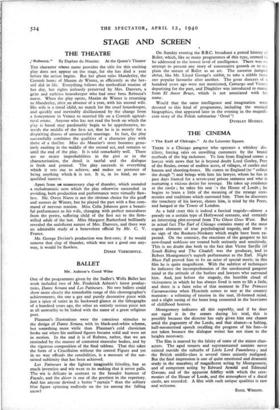THE CINEMA
"The Earl of Chicago." At the Leicester Square.
THERE is a Chicago gangster who operates a whiskey dis- tillery, forcing sales on unwilling customers by the brutal
methods of the big racketeer. To him from England comes a lawyer with news that he is beyond doubt Lord Gorley, Peer of the Realm, owner of endless acres, of villages, of castles and houses and shooting-boxes. He comes to England (to "collect the dough ") and brings with him his lawyer, whom he has in past days framed for a seven-year prison sentence and who is nurturing a vicious desire for revenge. He takes up residence at the castle ; he takes his seat a the House of Lords ; he begins to learn a little of the meaning of the strange cere- monies and traditions which surround him. Then he discovers the treachery of his lawyer, shoots him, is tried by the Peers, and hanged at the Tower of London.
As a bald story this is indeed a farcical tragedy—almost a parody on a certain type of Hollywood scenario, and certainly an interesting plot-reversal from The Ghost Goes West. But in actual fact The Earl of Chicago contains many of the most cogent elements of true psychological tragedy, and there is no sign of the Rookery-Nookery which might have been ex- pected. On the contrary, the reactions of the gangster to his new-found noblesse are treated both seriously and sensitively.
This is no doubt due both to the fact that Victor Saville (of South Riding and The Citadel) was the producer, 'and to Robert Montgomery's superb performance as the Earl. Night Must Fall proved him to be an actor of special merit; in this film he is quite magnificent. With the subtlest of techniques he indicates the incomprehension of the uneducated gangster mind at the attitude of the butlers and lawyers who surround him. And, just before the tragedy, the horrible cloud of viciousness in which he has always lived is seen to lift a little, and there is a faint echo of that moment in The Princess Cassamassima when Hyacinth comes to stay at the country mansion: a softening of tension in the taut, ill-formed mind, and a slight easing of the heart long cemented in the heaviness of childhood horrors.
Montgomery indicates all this superbly, and if he does not equal it in the scenes during his trial, this is possibly because the director has only given him one chance amid the pageantry of the Lords, and that chance—a halting, half-mesmerised speech recalling the progress of his fate—is not taken because the dialogue writer has not risen to the heights necessary.
The film is marred by the falsity of some of the minor char- acters. The aged tenants and superannuated nannies never existed outside the suburbs of Little Lord Fauntleroy ; and the British middle-class is several times unjustly maligned. But the final impression is one of quite emotional and dramatic study in the macabre; of magnificent acting by Montgomery, and of competent acting by Edward Arnold and Edmund Gwenn; and of the apparent fidelity with which the cere- monies of the House of Lords, and the atmosphere of a ducal castle, are recorded. A film with such unique qualities is rare and welcome.
BASIL WRIGHT.


































 Previous page
Previous page